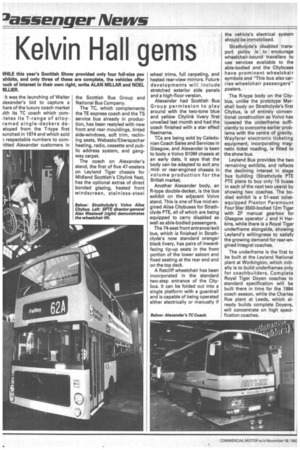Kelvin Hall gems
Page 20

If you've noticed an error in this article please click here to report it so we can fix it.
iff-IILE this year's Scottish Show provided only four full-size psv xhibits, and only three of these are complete, the vehicles offer 'Lich of interest in their own right, write ALAN MILLAR and NOEL MUER.
It was the launching of Walter Ilexander's bid to capture a hare of the luxury coach market i,ith its TC coach which cornletes its T-range of alloyramed single-deckers deeloped from the T-type first )unched in 1974 and which sold -1 respectable numbers to corn-lifted Alexander customers in
the Scottish Bus Group and National Bus Company.
The TC, which complements the TE express coach and the TS service bus already in production, has been restyled with new front and rear mouldings, tinted side-windows, soft trim, reclining seats, Webasto/Eberspacher heating, radio, cassette and public address system, and gang way carpet.
The coach on Alexander's stand, the first of five 47-seaters on Leyland Tiger chassis for Midland Scottish's Citylink fleet, has the optional extras of direct bonded glazing, heated front windscreen, stainless-steel wheel trims, full carpeting, and heated rear-view mirrors. Future developments will include stretched exterior side panels and a high-floor version.
Alexander had Scottish Bus Group permission to play around with the two-tone blue and yellow Citylink livery first unveiled last month and had the coach finished with a star effect fleetname.
TCs are being sold by Caledonian Coach Sales and Services in Glasgow, and Alexander is keen to body a Volvo B1OM chassis at an early date, it says that the body can be adapted to suit any midor rear-engined chassis in .volume production for the British market.
Another Alexander body, an R-type double-decker, is the bus exhibit on the adjacent Volvo stand. This is one of five mid-engined Ailsa Citybuses for Strathclyde PTE, all of which are being equipped to carry disabled as well as able-bodied passengers.
The 74-seat front entrance/exit bus, which is finished in Strathclyde's now standard orange/ black livery, has pairs of inwardfacing tip-up seats in the front portion of the lower saloon and fixed seating at the rear end and on the top deck.
A Rateliff wheelchair has been incorporated in the standard two-step entrance of the Citybus. It can be folded out into a single platform with a guardrail and is capable of being operated either electrically or manually if the vehicle's electrical system should be immobilised.
Strathclyde's disabled transport policy is to encourage wheelchair-bound travellers to use services available to the able-bodied and the Citybuses have prominent wheelchair symbols and "This bus also carries wheelchair passengers" posters.
The R-type body on the Citybus, unlike the prototype Marshall body on Strathclyde's first Citybus, is of entirely conventional construction as Volvo has lowered the underframe sufficiently to overcome earlier problems with the centre of gravity. Wayfarer electronic ticketing equipment, incorporating magnetic ticket roading, is fitted to the show bus.
Leyland Bus provides the two remaining exhibits, and reflects the declining interest in stage bus building (Strathclyde PTE PTE plans to buy only 15 buses in each of the next two years} by showing two coaches. The bodied exhibit is a 51-seat toiletequipped Plaxton Paramount Four Star 3500-bodied 12m Tiger with ZF manual gearbox for Glasgow operator and H Harkins, while there is a Royal Tiger underframe alongside, showing Leyland's willingness to satisfy the growing demand for rear-engined integral coaches.
The underframe is the first to be built at the Leyland National plant at Workington, which initially is to build underframes only for coachbuilders. Complete Royal Tiger Doyen coaches to standard specification will be built there in time for the 1984 coach season, while the Charles Roe plant at Leeds, which already builds complete Doyens, will concentrate on high specification coaches.




























































































